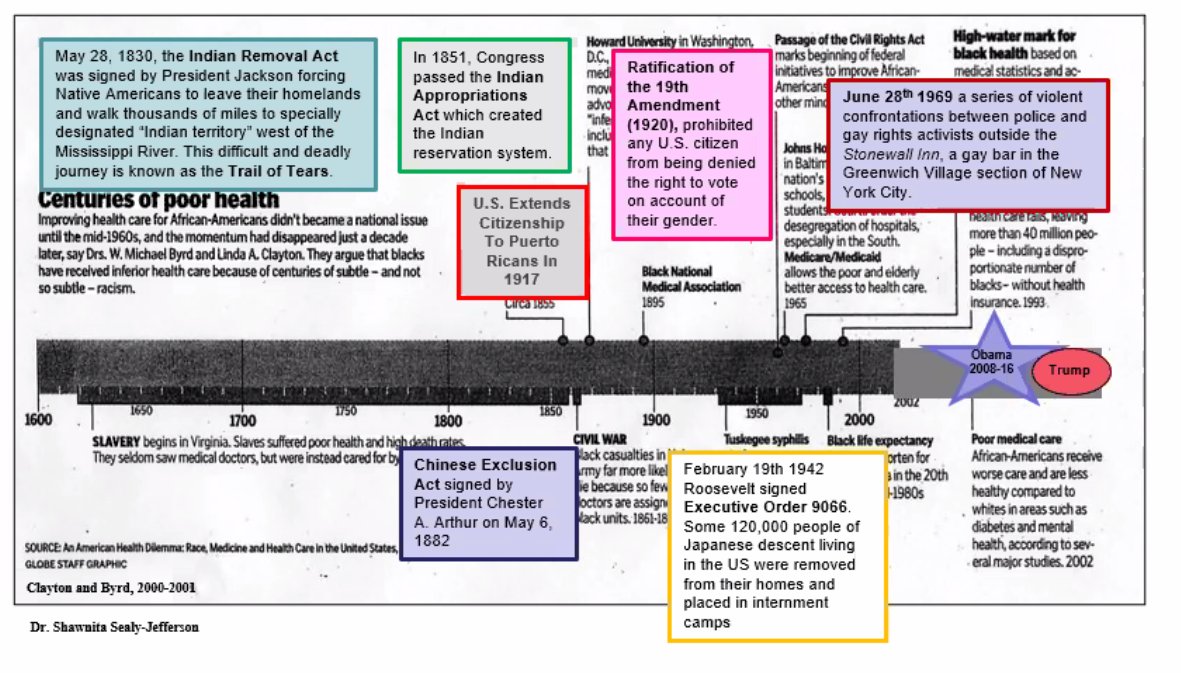Happening NOW - the first day of #SERweek2020 closing out with SER in the Moment: A Community-Wide Conversation with @oacarah @YYandtd @MarthaWerler and Sherman James.
https://twitter.com/societyforepi/status/1272525516621246464
Sherman James defines overlapping pandemic-related and endemic stressors faced by African American individuals:
1) COVID-19 (disproportionate deaths)
2) Economic collapse (increased unempl, loss of small businesses)
3) Systemic anti-black racism by police / vigilante killings
1) COVID-19 (disproportionate deaths)
2) Economic collapse (increased unempl, loss of small businesses)
3) Systemic anti-black racism by police / vigilante killings
"Racism is a fundamental cause of racial health inequities".
Mechanisms of systemic racism shift over time. Forces interact making it difficult for African Americans to gain economic security & prosper - often supported by gov't.
What does this look like? Redlining, voter suppression, gentrification, mass incarceration to list a few.
What does this look like? Redlining, voter suppression, gentrification, mass incarceration to list a few.
Dr. James highlights recent attention to systemic racism in science:
Diagnosing and treating systemic racism, N. Engl. J. Med. June 10, 2020, pp. 1-3.
Time to look in the mirror, Science. June 12, 2020, pp. 1161.
Diagnosing and treating systemic racism, N. Engl. J. Med. June 10, 2020, pp. 1-3.
Time to look in the mirror, Science. June 12, 2020, pp. 1161.
Systemic racism in science includes Black/White gap in NIH R01 grants, mentioned in "Time to look in the mirror". A study (Erosheva et al. 2020) found that strongest predictor of racial differences in avg. prelim. impact scores was perception of rigor in the analytic approach.
About SER - Black SER members had highest response rate to assessment of representation and perceived inclusion amongst members! But white males have highest % feeling very welcomed (66%), and minority m/f (40/48%) and non-response m/f (11/16%) is much lower. We can do better.
What can SER do: Established scientists
Welcome young black epidemiologists on behalf of SER, with timely/constructive feedback re grants, publishing, peer review <- which can punish young Black scientists
Welcome young black epidemiologists on behalf of SER, with timely/constructive feedback re grants, publishing, peer review <- which can punish young Black scientists
What can SER do: SER Leadership
Continue to be intentional about ensuring diversity of voices/perspectives at meetings, intensify efforts to make SER more BROADLY welcoming, welcome Black-led initiatives and create space for them (like the #SER2019 Critical Race Theory workshop)
Continue to be intentional about ensuring diversity of voices/perspectives at meetings, intensify efforts to make SER more BROADLY welcoming, welcome Black-led initiatives and create space for them (like the #SER2019 Critical Race Theory workshop)
What can SER do: SER journal editors-in chief (AJE and Epid Reviews)
Ensure editorial boards/associate editors represent field's diversity.
"Now is the time to step up & intensify efforts to make sure these journals that represent SER broadly represent diversity of the field".
Ensure editorial boards/associate editors represent field's diversity.
"Now is the time to step up & intensify efforts to make sure these journals that represent SER broadly represent diversity of the field".
Thank you Dr. James, moving on to @oacarah who raises questions to ponder: does SER have a role to play? What business is SER in? And at what points can we actually act?
If SER is in the business of epidemiology, and epidemiology is a core part of public health, then the answer is yes. SER has a role to play.
Where we can act: Look at the research we do. Who we're studying. Our publishing. Our mentorship. Just to name a few of the many. Be part of the solution!
Moving on to @YYandtd with a history of centuries of poor health. Other highlights not shown below (there's so much to show!):
Slavery lasted a quarter of millenia (246 years) and was extended for 99 years through Jim Crow laws - our current time is only 56 years later.
Slavery lasted a quarter of millenia (246 years) and was extended for 99 years through Jim Crow laws - our current time is only 56 years later.

Race as an exposure: "The race/ethnicity variable is a terrible proxy for a lot of different things. We spend so much time thinking about other things, but when it comes to talking about racial issues, we get sloppy with our theory and methods" (@oacarah)
Race as an exposure: Dr. James calls for more research on structural dimension of racism, noting that this research doesn't tend to appear in mainline epi journals (more in SSM, public health).
Would SER consider endorsing the statement on principles on race/ethnicity and health from American College of Epidemiology?
@MarthaWerler notes SER has traditionally shied away from acting on matters of policy, but leaves question of whether now is the time to change that.
@MarthaWerler notes SER has traditionally shied away from acting on matters of policy, but leaves question of whether now is the time to change that.
Also noted that room size issues at #SER2019 were by no means targeted, and SER has taken action to prevent this from happening at #SER2020!
Whew, what a session! There were so many good points that were inevitably missed here (especially some great Q&A) so if you missed this session, recordings will be made available to SER members and make sure to check out these other great live tweets 👇:
• • •
Missing some Tweet in this thread? You can try to
force a refresh




